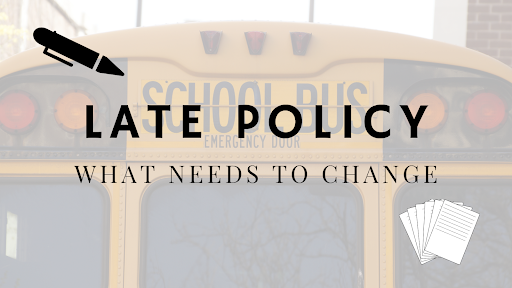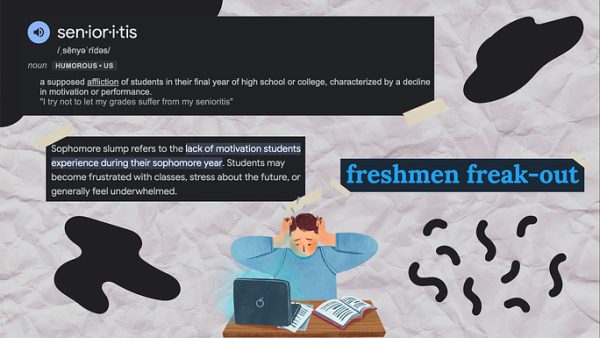Why Metea’s late policy needs to change
Districtwide, high school students are dealing with a number of things in their lives, many of which they are unable to control. However, in many cases, the school system apparently seems to prioritize attendance over positive mental health, and many a time fails to consider that students must sacrifice their learning opportunities to tend to things at home or outside of school. Or simply that students can not always anticipate not making it to school on time when circumstances arise, such as car trouble. Students are commonly met with unhelpful consequences and discipline upon arriving late to school, when instead the district should be striving to resolve the issues at hand and provide appropriate assistance to that student as necessary, deciding only to reprimand him or her if the excuse is unreasonable.
According to District 204 policy, “unexcused absences include, but are not limited to, oversleeping, working, missing the bus, car trouble, shopping, traffic, alarm clock problems, etc. After 48 hours, an unresolved absence becomes classified as unexcused.” Some of the few are more than acceptable; a student should ordinarily save leisure activities for outside school hours. On the other hand, many students at Metea have claimed to have undergone punishments for encountering some of the issues outlined, and are confused as to how lunch detentions would aid in dismantling this common problem.
Upon arriving to school one morning last semester in my mom’s car, the ignition suddenly stopped giving and the vehicle stopped at the intersection located in a stream of traffic. While we only live three minutes away from the school without traffic, we left around 20 minutes before the first school bell would ring- given that the 7:00 to 7:20 time slot is like rush hour for high school students. Yet, in that period of time, we were unable to jump the car and instead focused on manually relocating it to avoid an otherwise unsafe situation. Eventually, we realized that reviving the car was hopeless, and my mom called my brother and me in to formally excuse our being late to school. But when my brother and I walked into my class house, we were immediately told to fill out a lunch detention check-in form. Although I explained that my guardian had called us in as well as providing a good reason, I was informed that “car troubles are not excused,” as school drop-offs and driving one’s own car to school are optional, and the bus is always readily available.
Lunch detentions are not recorded on one’s school transcript, but I admit I was still upset about the situation. I was displeased at the fact that I had to take time out of my lunch period to sit in a classroom idle, when firstly, it would have been unproductive, and secondly, I didn’t know what I was supposed to be learning from the experience. I didn’t feel that I had done anything wrong, and I couldn’t have anticipated the car not functioning, otherwise, I would have taken the bus, except it had already arrived at 6:40 a.m. I was able to get out of the lunch detention once my mom called again to explain, but it was excessive for her to have called in twice when she had already done so.
In some cases, students try their hardest to make it to school even when things at home are not the most ideal, but they still end up arriving late. I have been called in for late arrival before and come to witness some explaining that their mornings were very difficult for them, or their parents were not there to drive them to school as usual at the last minute. Sophomore year, I remember arriving late once because the night before, I had a family situation that left me at a family friend’s house until I was able to go back in the middle of the night once things were settled. I was exhausted and overwhelmed, but I knew trying to make it to school was best, because I wouldn’t be missing material that I would otherwise be required to catch up on my own time. Still upset about the situation, I was dropped off late because everyone had slept in after a late night of chaos, and they sent me up to the class house again. In the midst of telling me they were going to give me a lunch detention, I became visibly upset and started tearing up- not about the detention, but that I had just dealt with something difficult and now had to deal with even more. Once the woman at the front desk noticed, she asked if I was okay and sent me to the social worker to talk during first period. As grateful as I was to have their support, I know if I had not been obvious about my emotions, I might have been reprimanded when I was only trying my best to be at school instead of missing entirely, but couldn’t do it all right. I know that the majority of other students probably wouldn’t have reacted so vulnerably like I did, had they suffered a similar situation at home, and they would have been met with disciplinary action.
Other situations can be less complicated, such as having a bus arrive late that wasn’t registered, and still receive a lunch detention. Junior Avyay Surampalli explains, “I was waiting for my bus to pick me up last year, but it came really late because it broke down and another one had to be sent in its place. I got to school late, and I was given a lunch detention for a tardy because my bus didn’t report coming late. I would have explained but I had a quiz first period and needed to get to class, but I just wish I had a warning because it was only my first time.” A number of students have reported receiving similar consequences for their bus failing to arrive on time, and had to make up for lost time when they couldn’t use their lunch periods for a better purpose. “I ended up serving the detention. I get that it’s a warning for discipline, but I felt it was unnecessary,” Surampalli said.
A handful of students also claim that during the passing period time before the first bell, they’ve finished parking their cars only to find that the doors leading outside the building available for earlier use are locked. While many have classes close to those doors, they would have been set to be on time had they been able to use entrances that were then closed. Apparently, such doors are locked between around 7:22 to 7:23 a.m., leaving students only two minutes to walk around the building to the next open door or main entrance while still making it to class at an appropriate time. While they would have arrived close to the bell, students have the liberty of doing so, so long as they set foot in the classroom by 7:25 a.m. With classes such as P.E., it’s only important that students be dressed before gym doors are locked and attendance can be taken with them present. Overall, teachers and students should have a mutual understanding of that student’s attendance patterns before any unnecessary steps are taken.
Understandably so, Metea staff must enforce students being in compliance with federal law regarding school attendance. Late arrival cuts into those mandatory hours, and they want to ensure that parents don’t get into trouble when their child doesn’t meet those requirements. However, occasional instances of tardiness should be examined more thoroughly that a well-meaning student without excessive tardies might not have to spend amounts of time in detention for a variety of reasons that the school may be unwary of or fail to address. Late policy must change for the benefit of the students and their overall educational experience.

Noelle Smagala is a senior, and this is her second year on staff now as social media Editor and website manager of Metea Media. Though she has loved writing...













Prashant Shankar • Feb 16, 2019 at 1:50 am
Hey Jojo,
I’m an alum (and former Metea Media editor), major in Electrical Engineering at UIUC, and currently intern at the US Army Construction Engineering and Research Laboratory. I had a lot of trouble waking up on time in high school, and was only able to get through high school without dozens of late slips with a very supportive and understanding faculty. I can’t thank them enough, but I was always worried about how I would fare when entering college or picking up a job.
Do you know what happens when you walk in a few minutes late to a college class? Nothing. Do you know what happens if I’m a few minutes late for work? Literally nothing. The fact is, tons of companies nowadays, even in retail, are adopting a culture of lenient hours that’s actually boosting productivity, because people worry less about a time deadline and more on what they’re working on. And I wake up at around 8 for both, while I had to wake up at 6(!!) for high school.
The relationship between the school and student go both ways. It’s up to the student to do his/her homework and show up, but it’s also up to schools to update their archaic late policy.
That’s the real world, and I’m getting pretty used to it!
Jojo • Feb 14, 2019 at 5:56 am
If you want a real change, go to the board. Run, get elected, change it. The board OK’s all schools handbooks and justifies it to the taxpayers because they don’t pay taxes to run the schools. They pay taxes to let the elected professionals run the schools. Join the board to make a change or get the ear of of the the board members. Doubt they’ll change the policies, they are similar wherever you go. It would be utter chaos and disrespectful to teachers’ time of those policies were changed and kids start to abuse the lenient policies because they will. It’s human nature, a loophole to being on time. Think about it.
Jojo • Feb 14, 2019 at 5:41 am
What’s going to happen in real life when you get a job and get fired for all your tardiness? Get sent to a social worker? Leniency? Understanding? Are you going to write to their supervisor to change their policy even if they have a business to run? Good luck. That’s not the real world. Get used to it.
Jordan Passley • Feb 12, 2019 at 1:29 pm
Aye Maurice, you got a vehicle lord? sniff
ummm yeah • Feb 12, 2019 at 8:35 am
I’m glad for someone to finally talk about this situation. Just yesterday I received a PM school for being late, which was entirely unnecessary, I would’ve been fine with lunch detention. My mom had even called in to say that I’d be late, and also the lady at the front desk proceeded to yell at me. I had such a long night babysitting and still had to finish homework that I went to sleep later than usual, like JEEZ I’m sorry I woke up late, but I won’t learn a single thing from serving a PM school. This school really needs to change these rules, they are so irrational, a PM school should be for a student who was disruptive, not for a student who was late and didn’t bother anyone.
Someone • Feb 12, 2019 at 7:34 am
Guys, he literally said he left for school early…
Ryan • Feb 11, 2019 at 10:05 pm
Often times my mom has forgotten to call me out of school when I have missed, and then I get in trouble for that in school. While different from the late arrival, I think that there need to be some kind of lenience on students who miss school and don’t get called out.
Abby • Feb 11, 2019 at 8:37 pm
When I went to Granger, I was late to school many times. And the assistant principle called me in to his office nearly everyday during class to try to solve the problems. The only reason I was late was because of improper planning and usage of time. But because he repeatedly pulled me out of class, I felt irritated. I told him the same thing every time we met. Attendance didn’t matter that much to me back then. I don’t think a student should be given detention for arriving late.
hhh • Feb 11, 2019 at 5:32 pm
This was well-written
kfc • Feb 11, 2019 at 12:07 pm
how about get to school early
Cabbage Merchant • Feb 11, 2019 at 11:39 am
Jake, to me it sounds more like the author doesn’t find consequences for events out of the student’s control to be fair.
. • Feb 11, 2019 at 11:33 am
I think all of the doors should be unlocked before 7:25am. Especially the doors that are at the end of the halls towards the parking lot. It’s ridiculous that those doors are locked. Tax payers paid for those doors, make em usable. just sayin.
jake kmiecik • Feb 11, 2019 at 10:32 am
sounds as if you think its okay to be late to things…